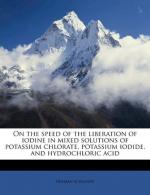|
This section contains 746 words (approx. 3 pages at 300 words per page) |

|
Rate of Reaction between Hydrochloric Acid and Sodium Thiosolphate
Summary: How the rate of reaction is determined and ways rate of reaction can be increased using the reaction between hydrochloric acid and sodium thiosophate as an example.
Aim:
My aim is to determine what affects the rate at which a reaction occurs between Hydrochloric acid and Sodium thiosulphate.
Na2S2O3 (aq) +2HCL (aq) SO2 (g) +H2O (l) +2NaCL (l) +S(s)
Background Knowledge:
The rate of a reaction is determined on how often and how hard the reacting particles collide with each other. Basically the particles need to collide in order to react.
There are four methods of increasing the rate of reaction, which make the particles collide faster and more often. The four factors are:
- Temperature: When the temperature is increased the particles all move quicker because they have had an increase in energy. If they are moving faster then there is going to be collisions.
- Concentration: If the solution is made more concentrated it means that there will be more particles of the reactants moving around in the solution, which makes...
|
This section contains 746 words (approx. 3 pages at 300 words per page) |

|


